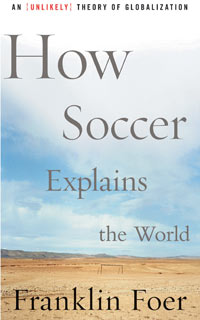
Soccer scribes are a bit like wine connoisseurs, detecting hints of national character where others just see corner kicks. They
also tend to be European (Nick Hornby)
or South American (Eduardo Galeano). Franklin Foer is that rare thing: a homegrown soccer pundit. Here, Foer presents the game as a case study on the effects of globalization, both good and bad. At times, this connection between sport and theory can feel somewhat forced and airy-fairy. But Foer put himself on a lot of airplanes, and several chapters stand alone as surgical strikes of intelligent reporting. In the former Yugoslavia, for example, he has a funny and terrifying interview with a member of a Serbian soccer gang that helped foment ethnic hatred.
He also writes movingly of a Nigerian forward
in Ukraine who has the awkward distinction of being the only black man that most locals have ever seen.
Foer’s bigger ideas about globalism lack the clarity of his reportage. His fervent hope is that as soccer becomes more polyglot and global, it will provide an outlet for a healthy, sporty togetherness that supersedes race and creed. The best example Foer uncovers is Iran, where soccer stadiums have become the place for both Arab men and women to engage with the Western world. And he
reserves his highest praise for the city of Barcelona, which he sees as a model of an open and adaptable culture that uses soccer to forge a benign but proud Catalan identity.
A lovely idea, yet Foer’s own reporting shows how religious extremism, racist attitudes, and jingoistic songs still thrive around the soccer pitch. And then there’s the United States, where the sport has long struggled to gain traction and, indeed, serves as a cultural fault line. Foer quotes an abrasive radio jock vowing, “My son is not playing soccer. I will hand him ice skates and a shimmering sequined blouse before I hand him a soccer ball.”















